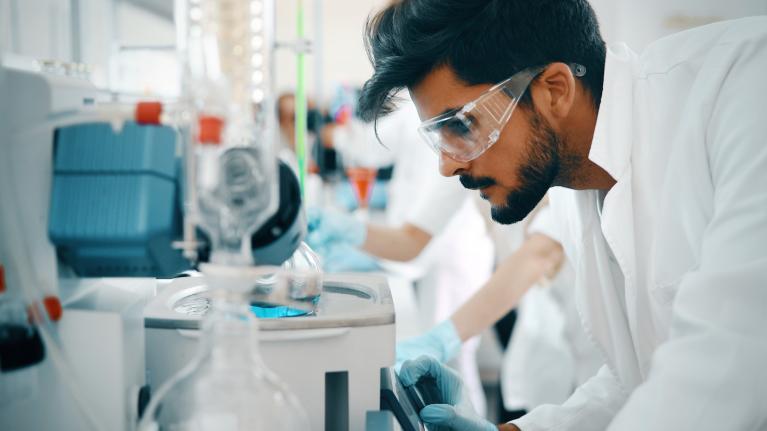
Computational and translational medicine
Computational and Translational Medicine
Our Computational and Translational Medicine (CTM) research group, based within the School of Biomedical Science, is a crosscutting interdisciplinary unit with a strong scientific setting in biomedical, health and computational sciences.
Our research
Our research group aims to better understanding of the fundamentals of biomedical and data science. We seek to explore rapid advances including new approaches to the description, collection, storage, integration and analysis of large, heterogeneous, structured and unstructured data sets. These include genome, biome, proteomes, patient records and new computational methods such as advanced deep learning, digital phenotypes, machine learning and artificial intelligence, as well as 3D imaging to transform biomedical and behavioural research to improve health of individuals, populations, plants, animals and the environment.
Group members
-
Dr Obed Brew
Associate Professor in Bioinformatics and GenomicsSchool of Medicine and BiosciencesWith over 29 years’ experience in healthcare and higher education (HE) including at least 16 years in senior positions in HE, I have made notable contributions to healthcare workforce development through both undergraduate and postgraduate biomedical science, bioinformatics, machine learning and artificial intelligence for health, precision medicine, nursing and medical workforce training. I studied Human Physiology and Pharmacology at the University Hertfordshire and later, Human Reproductive Biology at the Imperial College London.
Research Associates and PhD students
Within the School of Biomedical Sciences we currently have the following PhD students working towards achieving their doctorate:
- Clair Gyesi
- Huda Hassan
- Nurha Yingta
- Thesis title: Usefulness of occupational mHealth app prevention for healthcare workers
- Principal supervisor: Dr Obed Brew
- Secondary supervisor: Professor Jose Abdelnour-Nocera
- Third supervisor Dr Ikram Ur Rehman
- Suhirthakumar Puvanendran
- Yawo Ahonli
- Ibiyemi Sadere
Current research themes
- AI modelling and Precision medicine
- Modelling of disease pathways
- Identification and AI modelling of gene signatures
- Big data and Genomics architecture of diseases
- Blockchain and OpenEHR
- Data Architecture and Internet Security
- IoT and Tele-healthcare
- Digital Health Apps
- Digital user experience
Current projects
- AI modelling of the relationship between VOCs, gene signatures, and human diseases
- Impact of Genetic Variations on Histamine Synthesis and Metabolism in Pre-eclamptic Pregnancies
- Mobile Health Apps Redesign for healthcare worker wellbeing - User experience design approach
- Non-surgical combination therapies for hair restoration in patients with hair loss
- Translation of knowledge into digital patient decision aid tools – understanding service provider behaviours and service user experience.
-
Automatic recognition of Pre-eclampsia - an application of artificial intelligence to detect women at risk of developing Pre-eclampsia in early pregnancy
Doctoral Researcher: Mr Suhirthakumar Puvanendran
- Principle Supervisor: Associate Professor Obed Brew
- Second Supervisor: Professor Massoud Zolgharni
About the project:
This project aims to examine the effectiveness of an Artificial Intelligence-based predictive model to automatically recognise preeclamptic women in early pregnancy.
Analysis of cell-free foetal DNA (cffDNA) and RNA (cffRNA) in maternal blood is a high throughput technology to examine foetal genomic features, without interfering with the developing baby. In this study, we are using deep learning algorithms to integrate gene expression signatures, methylation signatures, and mutational signatures from cffDNA and cffRNA with maternal biomarkers to build a predictive model for the detection of PE.
Research impact:
This research may provide a useful predictive model to automatically identify preeclamptic women in early pregnancy. The model may contribute to providing less invasive, safer, and cost-effective high throughput technology to assess both foetal, placental and maternal health in early pregnancy. The study may also contribute to developing an AI-aided patient identification technology for precision medicine interventions in early pregnancy.
Please contact Principal Supervisor for further information: obed.brew@uwl.ac.uk
PhD project, topics and interests
We invite PhD applications for all above research themes.
-
Research degrees School of Medicine and Biosciences
Current PhD opportunities in the School of Medicine and Biosciences
Contact
Dr Obed Brew
- School: School of Medicine and Biosciences
- Address: University of West London, London, W5 5RF, UK
- Email: Obed.Brew@uwl.ac.uk
Find out more
-
Research Centres
Find out about our multi-disciplinary areas of expertise, research, and teaching.
-
Research impact
Learn how our research has helped communities locally, nationally and internationally.
-
Research degrees
Find out more about PhD and Professional Doctorate opportunities and how we will support you within our active and interdisciplinary research community.






